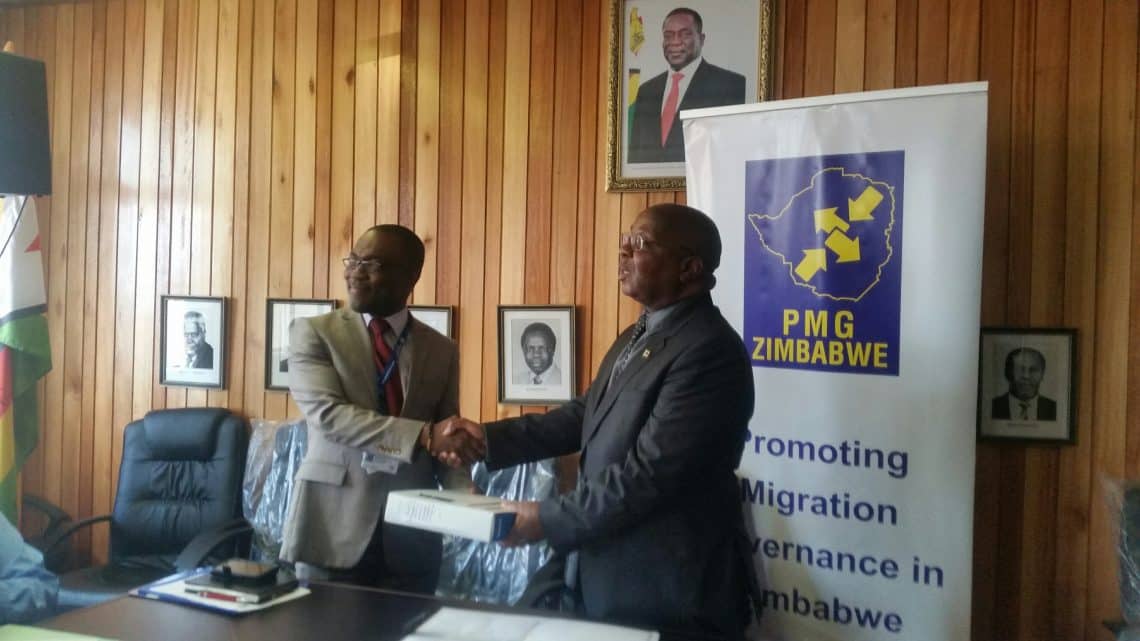By Byron Mutingwende
The International Organisation for Migration (IOM) Zimbabwe office has donated a public address (PA) system to the ministry of home affairs and cultural heritage to support the national response to human trafficking.
Speaking at the official handover of the PA system, Melusi Matshiya, the Permanent Secretary for the ministry of home affairs and cultural heritage, said the donation would enhance the capacity to effectively implement the Trafficking in Persons (TIP) Action Plan.
Zimbabwe has taken great strides in the fight against human trafficking in bid to ensure an end to the heinous crime. The national response to TIP is guided by the National Plan of Action (NAPLAC) for 2016-2018.
“A lot needs to be done to ensure the public is aware of the ever-changing dynamics of human trafficking. In our annual work plan for 2018, we have prioritised public awareness raising on TiP through the use of mass platform campaigns and road-shows targeting the whole country. I have no doubt in my mind that the PA system we are receiving today will go a long way in assisting us reach out to the public during these campaigns,” Matshiya said.
Daniel Sam, speaking on behalf of Lily Sanya, the IOM Chief of Mission said the Traffic in Persons Action Plan, in collaboration with the Government of Zimbabwe was within the framework of the “Promoting Migration Governance in Zimbabwe” project that is being implemented by IOM with funding from the European Union under the 11th European Development Fund.
“The aim of the project is to contribute to the establishment of a migration governance framework in Zimbabwe that supports state actors to manage migration in dialogue with non-state actors and in a migrant-centred, gender-sensitive, rights-based and development-oriented manner,” Sam said.
In line with international best practices, NAPLAC is based on the four pillars of protection, prosecution, prevention and partnership. Matshiya said the global anti-trafficking movement, now well into its second decade, had successfully used the 4P paradigm of prosecution, protection, prevention and partnership to strengthen how the world combats trafficking in persons.
The government has enacted laws that criminalise all forms of human trafficking and prescribe stringent sentences. Protection efforts have empowered individuals to move beyond their victimisation and rebuild their lives with dignity, security, and respect.
“Prevention measures, especially public awareness raising will provide our communities with valuable information about the risks of human trafficking, elevating public consciousness about this crime. Overtime, the government of Zimbabwe has made it a tradition to raise public awareness on human trafficking during the annual Zimbabwe International Trade Fair and the Harare Agricultural Show,” Matshiya said.
Effective prevention addresses the tactics of human traffickers head on. With the dissemination of accurate and targeted information, communities will be better prepared to respond to the threat of human trafficking. Strategic intervention programmes can reach at-risk populations before they are faced with deceitful recruitment practises of those bent on exploiting them for labour or commercial sex work among other forms of exploitation.
Meaningful partnerships between public and private sectors and civil society can expand awareness, leverage expertise, and facilitate creative solutions. Government is working to provide an enabling environment and policies that promote public awareness raising on such phenomenon that affects the public.
